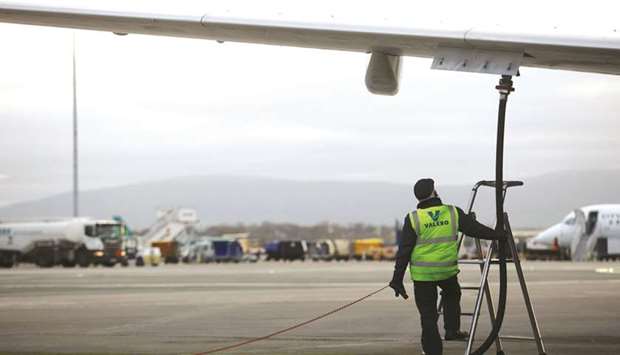Airlines’ fuel bill will rise to $200bn next year as a result of “delaying effect of hedging”, despite the falling jet fuel prices, IATA said here yesterday.
Making a presentation on IATA’s semi-annual report on the “Economic performance of the airline industry” at the ‘Global Media Day’ yesterday, chief economist Brian Pearce said jet fuel prices have fallen with oil prices and the global trade body of airlines has based its forecast on an average price of $81.3/b next year, and $65/b for the Brent crude oil price.
“However, the full benefit of lower oil will not be felt by airlines in 2019 because of the delay caused by hedging in some regions, Europe in particular, and the impact of increases in diesel demand from shipping responding to the IMO 2020 Sulphur regulations.
“So the fuel bill will rise to hit $200bn in 2019, which represents 24.2% of operating costs on average,” Pearce said.
The fall from the peaks of 2018 has been driven by an over-supply of crude oil, partly from shale oil production in the US. Opec is expected to limit their output at these prices levels, which are below fiscal breakeven points.
Fuel is such a large cost that it focuses intense effort in the industry to improve fuel efficiency, through replacing fleet with new aircraft, better operations and efforts to persuade governments to remove the airspace and airport inefficiencies that waste around 5% of fuel burn each year.
IATA forecasts that fuel efficiency, in terms of capacity use i.e. per ATK, will improve by 1.5% in 2019 as deliveries of new aircraft grow and as fuel prices rise sharply. The annual average per RTK fuel efficiency improvement from 2009-14 stands at 2.4%, versus the 1.5% industry target, Pearce noted.
Continued fuel efficiency gains have partially decoupled CO2 emissions from expanding air transport services, he said. Without the expected fuel efficiency gain this year, fuel burn and CO2 emissions would be 1.5% higher in 2019. That represents a saving of over 16mn tonnes of CO2, as well as saving on fuel that would have cost the industry and its consumers an additional $3.7bn, Pearce said.

An employee stands beneath the wing of an aircraft as it is refueled at Dublin Airport. Making a presentation on IATA’s semi-annual report on the u201cEconomic performance of the airline industryu201d at the ‘Global Media Day’ yesterday, chief economist Brian Pearce said jet fuel prices have fallen with oil prices and the global trade body of airlines has based its forecast on an average price of $81.3/b next year, and $65/b for the Brent crude oil price.

